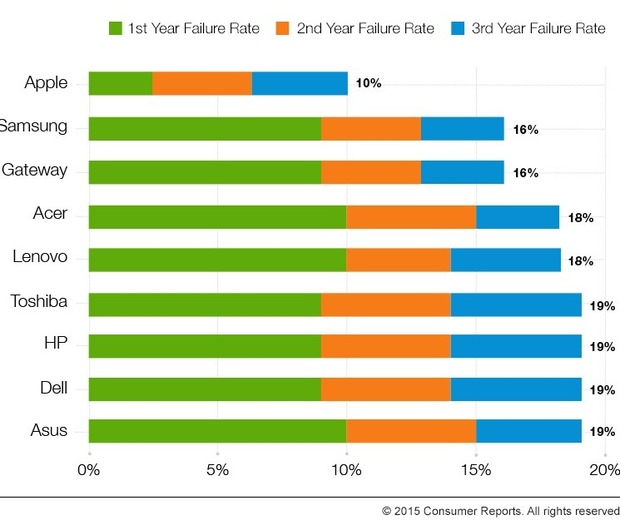Times are changing for the consumer laptop. The average lifespan of a portable computer is getting longer every year, with consumers able to look forward to an upgrade cycle of at least three years on the short run, before something goes seriously wrong.
Modern laptops are considerably more resilient and reliable nowadays, primarily thanks to two factors: the first one being a trend of increasingly energy efficient hardware, including new battery technologies and smart designs, and last but not the least, less moving parts, allowing for cooler and lighter laptops.
The relentless march of the Solid State Drive onto HDD territory is also beginning to have an effect on the expected lifespan of the average laptop.The traditional spinning drive works on technology dating back to the mid-1950s, with the first inception of a modern spinning hard drive dating back to the 1973 IBM Winchester HDD.
Spinning drives not only wear out faster, as it’s expected of any technology that involves grinding several metallic objects together on a daily basis, they are also slow, dragging performance and reliability of any computing device into the ground. This is due to the fact that operating systems don’t rely merely on physical RAM to run applications, they also create virtual memory using available space on the hard drive, which means that if the hard drive is slow, virtual memory created on that drive, no matter how much, it will also be less efficient.
Keyboard technology has also changed, in a way that we no longer have to stomp on keys like ten years ago, and even the trackpad’s “springboard” technology is on its way out, eliminating the potential for trackpad failure overtime, and being replaced by touch sensors instead.
Finally, displays are more energy efficient, and more reliable, to a point where dead pixels are almost a thing of the past.
With that said, it’s now down to how far we can push the lifespan of the modern laptop, and which brand comes out on top with the lowest rate of age-related issues over a three year span.

Consumers advocacy website Consumer Reports, has gathered data by interviewing over 60.000 American laptop owners, asking a number of questions designed to determine their actual experience with 9 laptop brands, more specifically:
- Apple
- Samsung
- Gateway
- Acer
- Lenovo
- Toshiba
- HP
- Dell
- Asus
According to the chart provided by Consumer Reports, nearly two thirds of the list above made it to the bottom of the list, with a first year failure rate close to 10%, 15% in the second year, and 19% towards the end of the laptop's life.
This trend was shown in at least six laptop brands, including Acer, HP and Dell.
Samsung and Gateway seem to be on par at second place, with a failure rate of 16% within the first three years, which makes it for a great average among Windows laptops.
In this list, Apple seems to reside within a category of its own, especially when it comes to the MacBook Air. The numbers show a failure rate within the first year as low as 3%, 6% within the second year, and 10% within the third year of life of the device,
Why the big difference? Mostly due to the fact that the “premium” price for Apple laptops is very much towards quality hardware and components, with less plastic being used in the manufacture of laptops bodies, and more machined aluminum, as well as a strong bias towards SSD and flash drives. This trend is expected to keep up and outperform current numbers in the years to come, as the company is moving decidedly towards eliminating moving parts from its laptops.
Consumers in the market for the most reliable laptop, should also get the best deal and top-quality service, when shopping in the right place.
At Portable One Inc, a locally owned and operated laptop retailer, shoppers looking to upgrade to a brand new MacBook Air, will find top-notch sales and technical support, as well as the best prices, the latter being worth of special attention this time of the year.